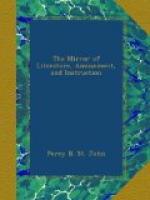“I suppose Murray has sent you, or will send (for I do not know whether they are out or no) the poem, or poesies, of mine, of last summer. By the mass! they’re sublime—’Ganion Coheriza’—gainsay who dares! Pray, let me hear from you, and of you, and, at least, let me know that you have received these three letters. Direct, right here, poste restante.—“Ever and ever, &c.”
AN EXECUTION.
To Mr. Murray.
“Venice, May 30th, 1817.
“I returned from Rome two days ago, and have received your letter; but no sign nor tidings of the parcel sent through Sir C. Stuart, which you mention. After an interval of months, a packet of ‘Tales,’ &c. found me at Rome; but this is all, and may be all that ever will find me. The post seems to be the only sure conveyance, and that only for letters. From Florence I sent you a poem on Tasso, and from Rome the new Third Act of ‘Manfred,’ and by Dr. Polidori two portraits for my sister. I left Rome and made a rapid journey home. You will continue to direct here as usual. Mr. Hobhouse is gone to Naples; I should have run down there too for a week, but for the quantity of English whom I heard of there. I prefer hating them at a distance; unless an earthquake, or a good real irruption of Vesuvius, were ensured to reconcile me to their vicinity.
* * * * *
“The day before I left Rome I saw three robbers guillotined. The ceremony—including the masqued priests; the half-naked executioners; the bandaged criminals; the black Christ and his banner; the scaffold; the soldiery; the slow procession, and the quick rattle and heavy fall of the axe; the splash of the blood, and the ghastliness of the exposed heads—is altogether more impressive than the vulgar and ungentlemanly dirty ’new drop,’ and dog-like agony of infliction upon the sufferers of the English sentence. Two of these men behaved calmly enough, but the first of the three died with great terror and reluctance. What was very horrible, he would not lie down; then his neck was too large for the aperture, and the priest was obliged to drown his exclamations by still louder exhortations. The head was off before the eye could trace the blow; but from an attempt to draw back the head, notwithstanding it was held forward by the hair, the first head was cut off close to the ears: the other two were taken off more cleanly. It is better than the oriental way, and (I should think) than the axe of our ancestors. The pain seems little, and yet the effect to the spectator, and the preparation to the criminal, is very striking and chilling. The first turned me quite hot and thirsty, and made me shake so that I could hardly hold the opera-glass, (I was close, but was determined to see, as one should see every thing, once, with attention;) the second and third (which shows how dreadfully soon things grow indifferent,) I am ashamed to say, had no effect on me as a horror, though I would have saved them if I could.




